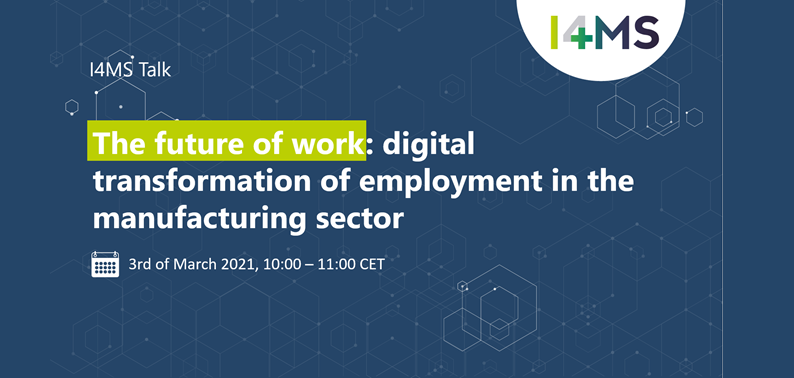I4MS Talk: The Future of work: digital transformation of employment in the manufacturing sector
Digital skills must be a priority for the manufacturing industry to step forward into digital transformation. In order to help the SMEs tackle the challenge, I4MS organized last Wednesday a talk followed by an interactive debate with experts on the field.

The online event, which took place last 3rd of March, was focused on the future of work, specifically on the digital transformation of employment. Experts on this matter were invited to present the challenges that involve this actual transformation. The I4MS Talk was initiated by Dr. Marta Portalés Oliva‘ presentation about I4MS. In addition, she gave an explanation about the opportunities and the journey of training and assessment that the European initiative offers to the SMEs.
The first talk was held by Mark L. Casidsid, lead scientific and strategic projects from World Manufacturing Foundation. The researcher has been sharing results from the non-profit organization 2020 report in which 50 experts from 30 different countries have been interviewed. Casidsid explained, among other significant inputs, the identification of some relevant skills and opportunities for the manufacturing sector.
The Digital Industry Training Atlas (DITA) has been introduced by Sara Canella, project communication manager at Nero Su Bianco. DITA’s objective is to create an online catalogue in 4 steps: 1. Analysis of the situation, 2. Application to real industrial environments, 3. The training co-design mechanism and 4. the matching:
“The objective of the DITA is to improve connection among organizations that provide training opportunities to offer new training that really meet with the need of the sector”

Florence Martineau-Dupré from Pôle Images et Réseaux explained the purpose of Change2Twin, which is to ensure that manufacturing SMEs have an easy access to technologies needed to deploy a digital twin. She also defined the Change2Twin assessment Tools.

AI Regio‘s approach to skills development and key figures have been presented by Mohammadmahdi Mohammadian & Sergio Gusmeroli. The latter appointed the need for a taxonomy in order to have a better vision of the real requirements for the manufacturing sector.
The event was followed by an interactive debate in order to identify the challenges and recommendations for SMEs, workers and public bodies together with the best practices.
See here the interactive board:
Among the challenges for the SMEs, it is clear that there are lacks of time and tools to ensure the upskilling and reskilling. It is also interesting to see the need for standardization of training and the creation of synergies. For the workers, the lack of a long-life learning mindset has been mentioned but also the awareness. The public bodies according to the debate should participate in studies together with businesses, being better aligned with the market needs and help the youngest to access opportunities.

Regarding the recommendations, SMEs are invited to act as facilitators for the workers by motivating them and implementing evaluation of skills. The creation of a European qualification system is another recommendation that could help the digital transformation to be effective. For the workers, it is essential to work on the awareness of training needs and for them to get familiar with the new technologies. The public bodies should better connect with industry stakeholders and help to create a common EU training recognition.

Different projects have been evoked when the debate has been focused on the identification of the best practices of SME upskilling such IAMQS or the HuMan project.



